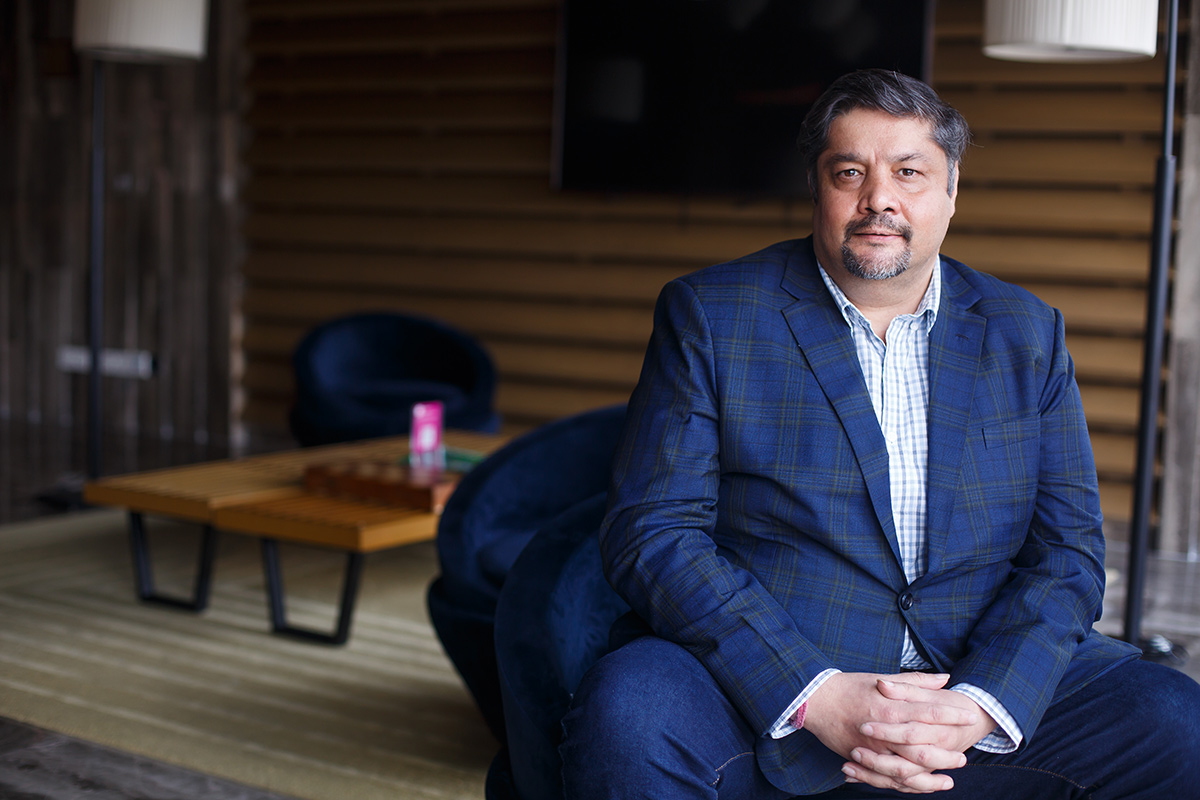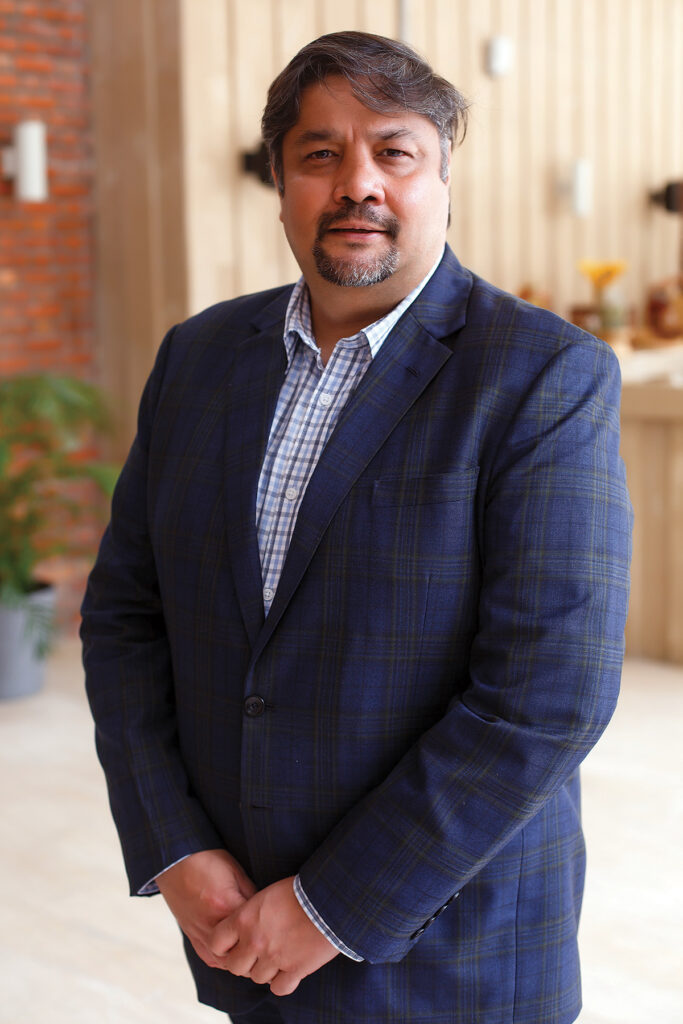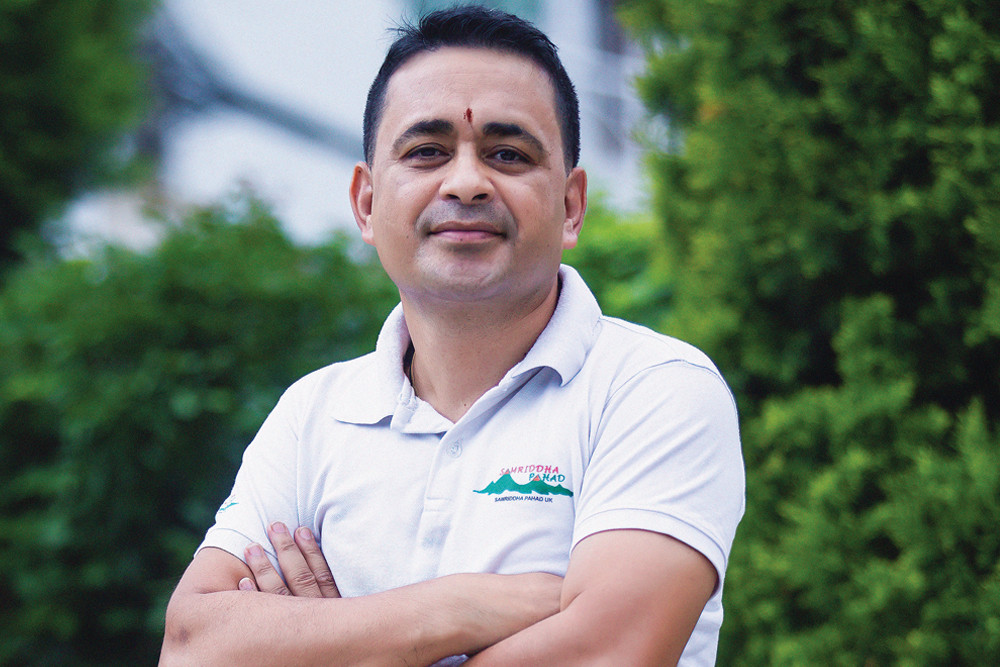
A passionate hospitality professional, Vikram Singh, has over 20 years of experience, leading business innovation within the hospitality industry in Asia, Africa, Europe and Middle East ranging from hotels to serviced apartments, boutiques, lodges and resorts.
Vikram loves Nepal and its people and culture. He previously worked as the General Manager of Le Meridien Kathmandu from 2007 to 2010 spearheading its transformation into the Gokarna Forest Resort.
At present, he is the operating and pre-opening General Manager of Aloft Kathmandu Thamel, one of Marriott International’s numerous brands and the first in Nepal. Aloft Kathmandu Thamel is ‘different by design’ with 167 rooms and suites, fun food and beverage outlets and meeting spaces, among others. It is designed for global travellers who love open spaces, open thinking and expression.
In this edition of Business 360, the versatile and go-getting hospitality professional shares his views on leadership.

What’s your definition of a leader?
A leader is someone who can see things from a different perspective and work towards making their vision a reality while putting people first. In today’s world, a leader is someone who can understand the requirements of all stakeholders – owners, management, the team and synergise those into a common goal and work towards achieving it. Just being able to motivate people isn’t enough — leaders need to be empathetic and connect with people to be successful. They don’t have to come from the same background or follow the same path. I strongly feel that future leaders will be more diverse and bring a variety of perspectives. A leader can unite their organisations internally with their definition of leadership. A great leader possesses a clear vision, is courageous, has integrity, honesty, humility and clear focus. One example which I love to give is that a leader should be like a symphony maestro who can get together a team of strong talents with different musical instruments and ensures that when they work together they make beautiful music and not ordinary sounds.Is leadership ‘in-born’ or ‘acquired’?
Leadership could be both or either one. If somebody has the leadership skills but does not choose to lead, it is pointless. Leaders need to choose to become leaders. Leadership skills need to be polished or developed. They need to have conviction and knowledge which can be in the form of information, skills or relationships. These things can be acquired, learned and developed in the social context. Those who do not wish to become leaders are then pushed to take on the role, because of a need. For most, choosing to step up and take on a higher role in any organisation does not happen overnight. It takes years of education, practice and relationship cultivation to hone leadership skills in an individual. A leader never acts on impulse, but analyses, studies and considers all factors present in decision making. I have realised that an important asset of an inborn leader is they use their gut instinct to make decisions. I believe that a great leader is a combination of both inborn and acquired skills. With these, they grab opportunities to be masters of their craft and equip themselves with the knowledge and skills needed and aspire mastery in their respective fields.Who comes to your mind as ‘an ideal leader’?
I don’t think that there is a perfect example of an ideal leader. We have so many great champions each having their own characteristics and unique blend of skills which make them successful. To quote Shazam –“The wisdom of Solomon, the strength of Hercules, the stamina of Atlas, the power of Zeus, the great courage of Achilles and the speed of Mercury.” Like I mentioned above, we must absorb from a variety of great leaders across genres and learn such traits to add to our own skill sets and DNA.
Could you share with us any incident that tested your leadership ability?
Nothing has tested leadership skills across the globe more than the present pandemic situation, and the same applies to me as well. We opened the Aloft Kathmandu Thamel in July 2019 and in January 2020 we were chuffed at the business bookings and were seeing a high business forecast for 2020. But by March 2020, the wheels on all future bookings had fallen apart as the world plunged into a crisis. Our first and foremost concern was the safety and security of our guests and associates. Hence, our entire team started understanding from the teams at Marriott International and CDC about the pandemic in detail. We were all thrown into the unknown. By structuring my team, finding the strengths of all the members, and delegating tasks,we were able to improve and adapt our systems and processes to the new normal. This resulted in a team effort, with us delivering results that were impossible to get as the pandemic situation was changing every hour. We had a good number of in-house guests, who were not able to return to their countries for many months. We had to have possible solutions for all that could go wrong and apply them as the situation developed. But here we are today with each of my associates still working and safely vaccinated. Nothing has tested my leadership as this pandemic has even after being on the job for more than 20 years!How important is it to have a good team to work with?
One of the most critical elements is to have a good team especially so in the service industry where we need to cater to our guests 24/7. The standards must be consistent and unique at the same time. Teams that work well together result in an organisation with happy employees and most people and businesses prefer to do business with organisations whose employees have a strong work ethic and team spirit. I am very fortunate to have an excellent team who has been there since before we opened the hotel.When should leaders hand over the leadership position?
In my opinion when there is a major extreme – whether the organisation is doing extremely well or extremely bad – a good leader is always grooming future leaders and needs to develop an understanding. They need to learn to gauge the situation and see whether it has been a success or a failure. The main key lies in the alignment to the leader’s vision and successful transitions. This should be part of a well thought out strategy with enough time to hand over the duties in an orderly manner.What major challenges has Covid 19 brought to the hotel business?
The Covid19 virus is changing everything about how we live and work, so this experience feels like an ongoing roller coaster ride. This has made us understand the business like never before, and we have to dig deep into our core values and redefine ourselves as both individuals and leaders. I think this applies just not to me but everyone else. The biggest challenges were at the macro level with business steadily decreasing from January 2020 to almost scratch from March 2020 and then the domino effect took place. Though we were lucky to have guests through this time, we had to go back to the drawing board for every process and relook at the same from the ground up in a leaner, more effective manner. On the flip side we had to be very aggressive and ramp up the safety and hygiene systems/processes for our guests and associates. However, keeping the hotel open through the pandemic so far was the best thing we could have achieved as a team. It was baptism by fire, and we had to re-plan and then re-execute all our processes in line with the new normal. I really appreciate our Chairman,Prithvi Pande, and the owning board who backed us during this pandemic and thus kept contributing to Nepal’s economy. We managed to prevent job losses despite major challenges.What do you consider your most significant accomplishment as a leader?
Keeping the safety and security of our guests and associates as our top priority and making sure that Aloft Kathmandu Thamel never shuts even for a day during the pandemic, especially as a new hotel, was a major achievement. We were able to retain all our team as well.How can a leader prepare for the unknown?
I personally feel that keeping in touch with the team and maintaining an open line of communication does wonders. Reading informative magazines, conducting further studies, keeping in touch with professional organisations, and maintaining a track with the current organisation is helpful. Learning from the internet is also an amazing experience if utilised properly. Mostly we need to keep evolving as individuals.
Published Date: August 31, 2021, 12:00 am
Post Comment
E-Magazine
RELATED Leadership


.jpg)


.jpg)